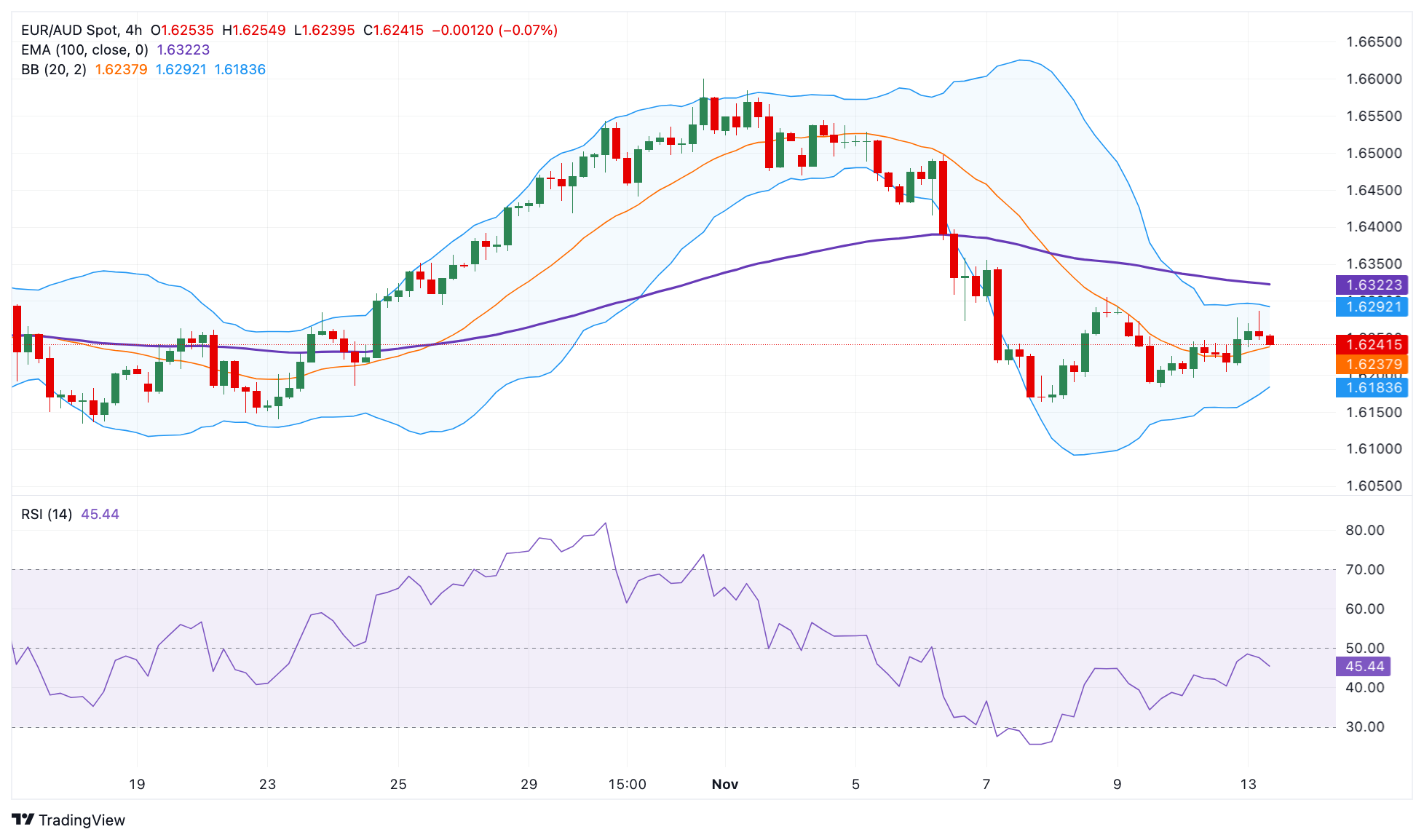EUR/AUD Price Forecast: The cross keeps the bearish vibe near 1.6250
- EUR/AUD edges lower to near 1.6250 in Wednesday’s Asian session.
- The cross maintains the negative view below the 100-period EMA, with the bearish RSI indicator.
- The initial support level is seen at 1.6183; the first upside barrier is located at 1.6293.
The EUR/AUD cross struggles to gain ground around 1.6250 on Wednesday during the early European session. The US proposed tariff increases on Chinese goods by US President-Elect Donald Trump undermine the China-proxy Australian Dollar (AUD) as Australia is one of China’s largest exporters.
According to the 4-hour chart, the bearish outlook of EUR/AUD remains intact as the cross holds below the key 100-period Exponential Moving Average (EMA). Furthermore, the downward momentum is supported by the Relative Strength Index (RSI), which stands below the midline near 46.50, suggesting that there could still be room for further downside in the near term.
The initial support level for the cross emerges near the lower limit of the Bollinger Band at 1.6183. Extended losses could see a drop to 1.6135, the low of October 18. The additional downside filter to watch is the 1.6100 psychological level.
On the upside, the upper boundary of the Bollinger Band near 1.6293 acts as an immediate resistance level for the price. The next hurdle is seen at 1.6322, the 100-day EMA. Any follow-through buying see a rally to 1.6500, round number.
EUR/AUD 4-hour chart

Euro FAQs
The Euro is the currency for the 19 European Union countries that belong to the Eurozone. It is the second most heavily traded currency in the world behind the US Dollar. In 2022, it accounted for 31% of all foreign exchange transactions, with an average daily turnover of over $2.2 trillion a day. EUR/USD is the most heavily traded currency pair in the world, accounting for an estimated 30% off all transactions, followed by EUR/JPY (4%), EUR/GBP (3%) and EUR/AUD (2%).
The European Central Bank (ECB) in Frankfurt, Germany, is the reserve bank for the Eurozone. The ECB sets interest rates and manages monetary policy. The ECB’s primary mandate is to maintain price stability, which means either controlling inflation or stimulating growth. Its primary tool is the raising or lowering of interest rates. Relatively high interest rates – or the expectation of higher rates – will usually benefit the Euro and vice versa. The ECB Governing Council makes monetary policy decisions at meetings held eight times a year. Decisions are made by heads of the Eurozone national banks and six permanent members, including the President of the ECB, Christine Lagarde.
Eurozone inflation data, measured by the Harmonized Index of Consumer Prices (HICP), is an important econometric for the Euro. If inflation rises more than expected, especially if above the ECB’s 2% target, it obliges the ECB to raise interest rates to bring it back under control. Relatively high interest rates compared to its counterparts will usually benefit the Euro, as it makes the region more attractive as a place for global investors to park their money.
Data releases gauge the health of the economy and can impact on the Euro. Indicators such as GDP, Manufacturing and Services PMIs, employment, and consumer sentiment surveys can all influence the direction of the single currency. A strong economy is good for the Euro. Not only does it attract more foreign investment but it may encourage the ECB to put up interest rates, which will directly strengthen the Euro. Otherwise, if economic data is weak, the Euro is likely to fall. Economic data for the four largest economies in the euro area (Germany, France, Italy and Spain) are especially significant, as they account for 75% of the Eurozone’s economy.
Another significant data release for the Euro is the Trade Balance. This indicator measures the difference between what a country earns from its exports and what it spends on imports over a given period. If a country produces highly sought after exports then its currency will gain in value purely from the extra demand created from foreign buyers seeking to purchase these goods. Therefore, a positive net Trade Balance strengthens a currency and vice versa for a negative balance.




